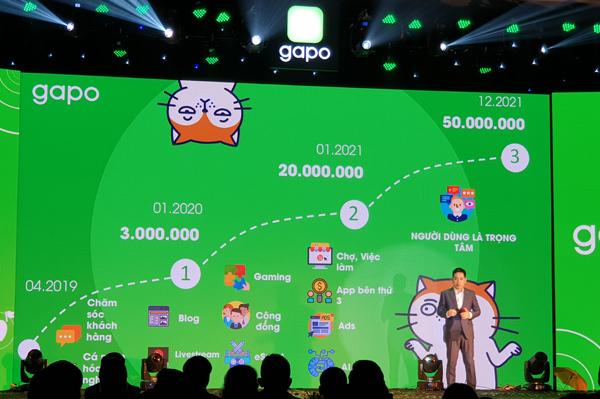When Facebook set foot in Vietnam, Vietnam’s social networks were already here, but then had to leave some months later. The same occurred when YouTube and Tik Tok came to Vietnam.

Vietnamese competitors have been defeated right in their home market, though they enjoy many advantages.
However, the competition between foreign rivals and Vietnamese competitors is unequal because of the former’s powerful financial capabilities and the latter’s lack of capital.
When streaming appeared in Vietnam, ccTalk, which later changed its name to TalkTV, developed by VNG, had been dominating the market for a long time.
It created the first ‘online idols’ in Vietnam, i.e. those who sing and dance to get donations from viewers. TalkTV was the ‘launching pad’ for ViruSs, PewPew and other famous streamers, and helped create the ‘Happy Polla fever’ in Vietnam.
Regrettably, the platform could not retain the idols and streamers amid the wave from Bigo Live, Nimo TV and Nonolive. Finally, it had to shut down in late 2018.
| From Umbala to 360Live, Vietnam’s technology platforms have failed to compete with foreign rivals such as Tik Tok and Bigo Live. |
The effort to change and renovate the product with 360Live could not bring success and the platform also had to stop operation.
VNG, the developer of the platforms, never made public the figures related to these products. However, analysts estimate that in the golden days, TalkTV attracted 100,000 concurrent viewers (CCU), according to former product director La Xuan Thang.
As for Umbala, CEO Nguyen Minh Thao said Tik Tok, the strong rival, used its money to crush Umbala. The foreign platform scrambled to hire personnel from Umbala, offering salaries five times higher, and enticed content producers to create content for Tik Tok at the price of VND200,000 for every video.
ByteDance, the holding company of Tik Tok, even spent $1 billion to take over the US-based Musical.ly in 2017.
Meanwhile, Bigo Live, Nimo TV and Nonolive all received millions of dollars worth of investments to conquer the Southeast Asian markets.
Bigo Live was bought by Chinese YY.com in 2019. Both Nonolive and Nimo TV belonged to the two Chinese largest live-streaming platforms – Douyu and Huya. The biggest shareholder is the giant Tencent.
Analysts say that the common characteristic of foreign platforms is powerful financial capability, which draws Vietnamese idols and streamers who cannot resist the lucrative offers from them.
Linh Ngoc Dam, a well known streamer and gamer, revealed that she was offered $20,000 a month to work for Nonolive in 2018. And Dam is not the best paid streamer in Vietnam.
The lack of capital not only affects the expansion capability of Vietnamese platforms, but also weakens the ability to maintain and develop internal products.
Users complained about lags with ccTalk, or TalkTV, after updates. The limited load capacity of the server and bandwidth was a big barrier, and not as stable as Facebook and YouTube.
The record set for livestreaming on Facebook Gaming in Vietnam was 137,000 CCU, made by Nam Blue in August 2020.
YouTube set a new record of 242,000 CCU by Do Mixi. As for TalkTV, its highest record was 30,000 CCU at the showmatch between QTV and SofM in 2015.
Most recently, Rap Viet scored a record in number of TV viewers with 700,000 CCU at a gameshow on YouTube.
Football matches of the Vietnamese U-23 national soccer team have also attracted a record high number of millions of viewers on YouTube and Facebook.
Recently, Vietnamese social networks such as Gapo and Lotus have tried to invite celebrities to livestreams to attract more viewers. However, they are facing the same problem as TalkTV did in the past.
Both VNG and Umbala could not answer VietNamNet’s question about why Vietnamese platforms always face difficulties in the home market. If no answer can be found, it will be difficult to beat emerging rivals like Tik Tok, and even more difficult to fight ‘veterans’ like YouTube and Facebook.
Phuong Nguyen

The richest self-made streamers in Vietnam
With stable incomes during the Covid-19 pandemic and large fanbases, streaming is a job pursued by many young people, but only a few are hugely successful at this moment. .

What if Vietnamese streamers use foul language, talk nonsense?
Many YouTubers and streamers have been criticized for their bad language, which harms young viewers.
